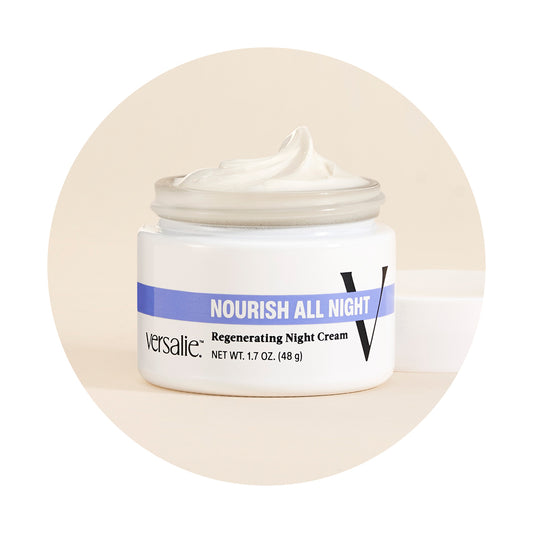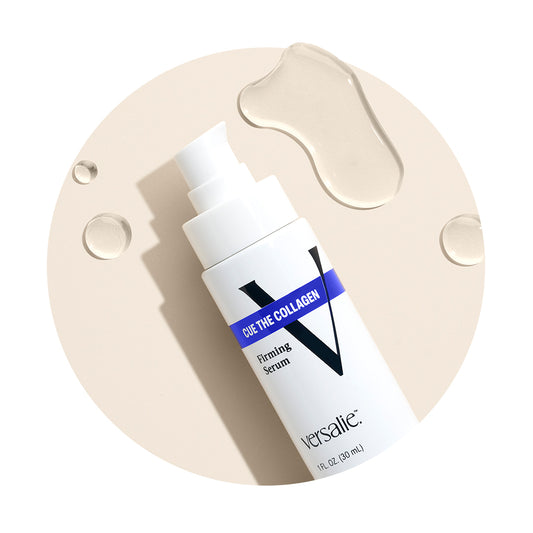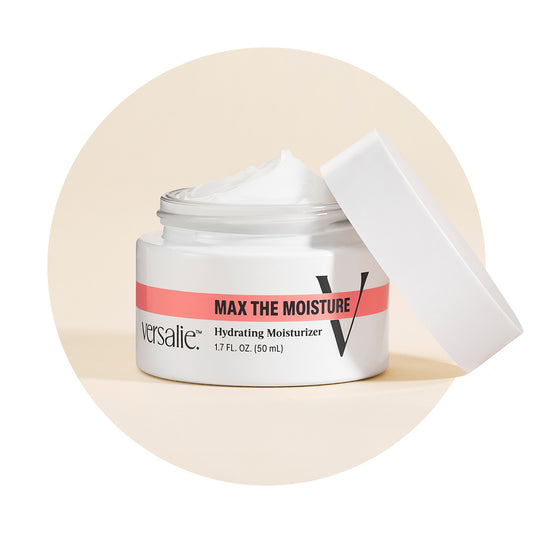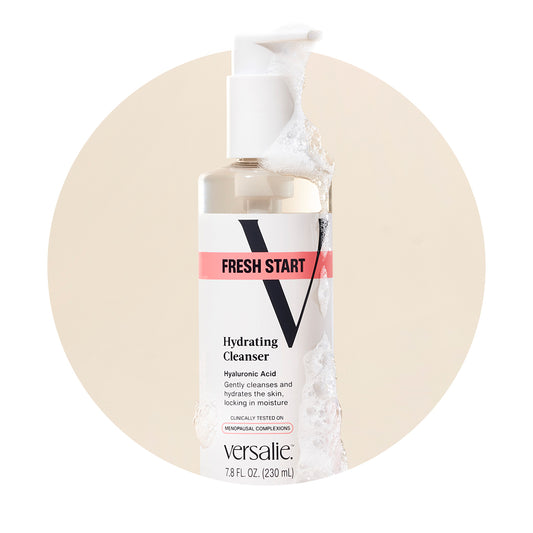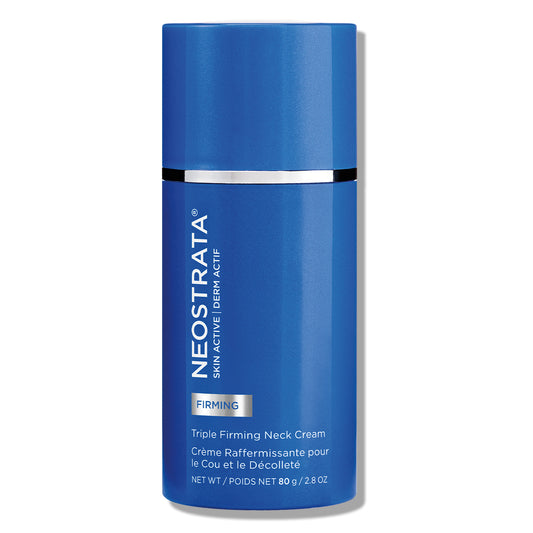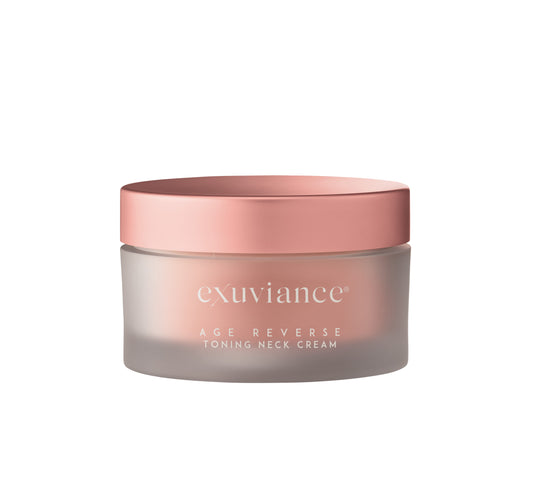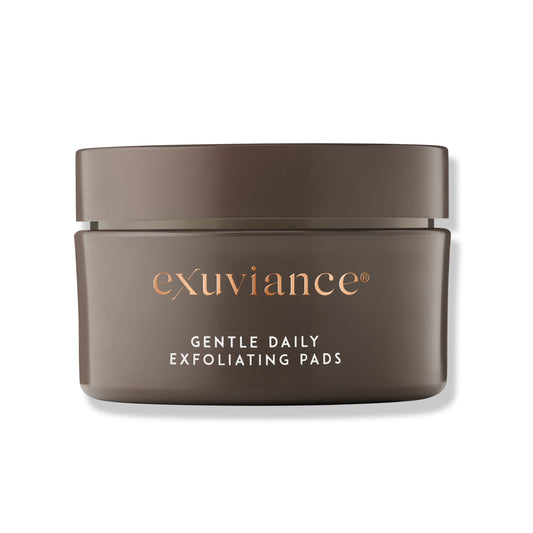If you’re anything like me, you hate the feeling of dry skin and love some good body lotion. My partner jokes that I have as many types of lotions as I do body parts! Face lotion, foot lotion, lotion for my body, lotion for my hands, even lotion for my cuticles. You get the point. And while moisturizing skin from the outside is one way to combat dry skin, there’s a lot more to it.
Menopause has a profound impact on the skin. Dry skin, particularly on the face and body, is a common and often annoying symptom that many people experience during this phase of life. And it's quite common — 23% of females between the ages of 40 and 65 say they have dry body skin, while 14% also report they have dry facial skin.*
To understand how to best manage this symptom, it’s first helpful to understand the complex relationship between menopause and dry skin.
The connection between estrogen and skin
Estrogen has many functions in the body, one of which is to maintain overall skin health. Specifically, estrogen plays a role in keeping the skin hydrated and pliable. It helps to encourage the production of two proteins in the body, collagen and elastin, that help to keep the skin firm and supple.
Estrogen and progesterone help regulate the sebaceous glands in the body. These glands produce something called sebum, which is a type of oil that keeps the skin moisturized. During menopause, when these hormones decline, the body produces less sebum and the skin’s ability to retain moisture diminishes, making it more prone to dryness.

There are a few other changes that the skin goes through because of a drop in estrogen levels:
- Skin thinning. One of the most noticeable menopause-related skin changes is thinning skin. As estrogen levels drop, the skin becomes thinner and less capable of retaining moisture, leading to dryness and an increased risk of fine lines and wrinkles.
- Reduced collagen production. Estrogen helps promote the production of collagen, which gives the skin its firmness and structure. When it drops, less collagen is produced, causing more static wrinkles and loose skin to form.
- Weakened skin barrier. Estrogen helps maintain the skin's natural barrier function. As estrogen levels drop, this barrier can weaken, leaving the skin more vulnerable to environmental factors, like UV rays from the sun, and moisture loss.
Dry skin appearance
Dry skin can look and feel a variety of different ways. During menopause, dry skin often presents itself in the following ways:
- Tight and itchy. Dry skin can sometimes give the sensation of tightness on your face and body, sometimes accompanied by persistent itching.
- Fine lines and wrinkles. The reduction in collagen and elastin that occurs as estrogen levels decline can contribute to the development of fine lines and wrinkles.
- Flaky and discolored. Dry skin can lead to flakiness, especially on the face. This flakiness can sometimes lead to redness, some discoloration, and/or skin irritation.
- Dull complexion. The loss of moisture and radiance can result in what looks like a dull complexion.
- More sensitive. Dry skin is often more sensitive, making it more prone to becoming inflamed and potentially reacting to certain skincare products.

Everyday tips for managing dry skin
While menopause may inevitably bring about changes in the skin, there are several practical steps that you can take to manage dry skin effectively:
- Protect against the sun. Protect your skin from harmful UV rays by wearing sunscreen daily. Make sure your sunscreen offers broad-spectrum (UVA and UVB) protection and has an SPF of 30 or higher.
- Hydrate from the inside. Stay well-hydrated by drinking water throughout the day. We often forget that the skin is an organ — the largest in the body. Water is essential for overall skin health and helps maintain its proper function.
- Focus on your routine. Tailor your skincare routine to tackle the specific needs of your dry skin. Use a gentle, hydrating cleanser and apply moisturizer daily. Look for products containing ingredients like hyaluronic acid, ceramides, and glycerin, which can help lock in moisture.
- Avoid hot showers. Hot water can strip the skin of its natural oils, leading to more dryness. Try taking a lukewarm shower instead. After a few, you’ll get used to the temperature shift.
- Humidify your environment. Use a humidifier in your home to help maintain ideal moisture levels in the air. This can help to prevent excessive moisture loss from the skin.
- Choose your diet well. Incorporate foods rich in essential fatty acids, such as salmon, flaxseeds, and walnuts, into your diet. Omega-3 fatty acids can support skin health. Additionally, some people find relief from dry skin by taking omega-3 supplements or evening primrose oil capsules.
- Consult a dermatologist. Consider talking to a board-certified dermatologist. They can provide specialized treatments and recommendations tailored to your specific skin concerns.
While a frustrating symptom of menopause, dry skin is something that can be managed and treated with the right knowledge, routines, and nutrition. So, reach for your lotion, stay hydrated, use appropriate skincare products, protect against UV damage, and consider various treatment options to maintain healthy and radiant skin. Use this time in your life to shine!
*Data from Attitudes & Usage study conducted in August 2021 with 4,578 female participants ages 40-65. Funded by Kenvue.



